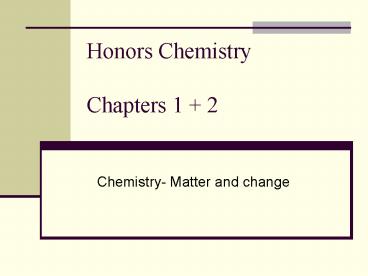Honors Chemistry Chapters 1 2 - PowerPoint PPT Presentation
1 / 15
Title: Honors Chemistry Chapters 1 2
1
Honors ChemistryChapters 1 2
- Chemistry- Matter and change
2
Science vs. Chemistry
- Science- "knowledge attained through study or
practice (Websters) - Translation Systematic approach to determine the
nature of the universe - Translation Using the scientific method to
investigate the world
- Chemistry- the study of the composition and
changes undergone by materials - Translation Using the scientific method to
figure out what stuff is and what it can do
3
Five Branches of Chemistry
- Organic
- Inorganic
- Analytical-composition of substances.
- Physical-behavior of chemical substances
- Biochemistry
4
Chemistry Can Be
- Pure
- For the advancement of knowledge about our world
- Applied
- For a specific issue that faces society
- Pharmaceuticals, etc.
5
Scientific Method
- Question
- Hypothesis
- Experiment
- Results
- Conclusion
- Peer review
- Maybe,
- much, much later
- Theory/Law
6
Important Distinctions
- Hypothesis
- After RESEARCH
- States a specific prediction based on past
experimental results or research - Usually in the IF, THEN format
- Experiment
- Designed to INVESTIGATE THE HYPOTHESIS
7
Important Distinctions
- Results
- Compile and LOOK FOR PATTERNS in experimental
results - DOES NOT EXPLAIN WHY
- Conclusion
- Explains WHY for the results
- Addresses whether or not the results SUPPORT or
REFUTE the HYPOTHESIS - Errors and future research are offered here
8
Important Distinctions
- BOTH
- After EXTENSIVE, DIVERSE, AND RELIABLE data
exists - Require many years of research and support from
many fields
- Law
- Tells what
- Theory
- Explains why
- THIS IS THE BEST SCIENCE CAN DO!!!
- SCIENCE DOES NOT PROVE
9
Important Distinctions Continued
- Qualitative- sensory observations (EX brown)
- Quantitative- numerical measurements (EX 5 lbs)
- Observation- objective explanation of phenomena
- Inference- subjective explanation of phenomena
10
Classification of Matter
- Matter CAN change state
- Three basic states of matter
SOLID LIQUID GAS
Definite Shape
Definite Volume
Particle Spacing
11
More Important Distinctions
- Material- specific type of matter
- Matter- has mass and takes up space (has property
of inertia) - Mass- amount of stuff in an object
- Weight- force of gravity of mass
- Mixture- composed of 2 or more substances
physically combined - Heterogeneous- composition varies
- Homogeneous (solution) - uniform composition
- Substance- purely 1 type of matter (elements and
compounds) - KNOW YOUR ELEMENTS
12
Separating Mixtures
- ALL MIXTURES CAN BE SEPERATED PHYSICALLY
- Filtration- used to separate a mixture with
widely varying particle size - EX rocks and water
- Distillation- used to separate a liquid mixture
- EX alcohol and water
- Crystallization- used to separate an aqueous
mixture - EX salt water
- Chromatography- separates a mixture based on
polarity (affinity for stationary/mobile phase)
13
Distillation
14
Changes to Matter
- Physical change- occurs without altering makeup
- Chemical change- occurs through alteration of
substance
15
Chemical Reactions
- Must involve at least one material changing into
a new material - and
- Must obey the Law of Conservation of Mass
- Mass is neither created nor destroyed in chemical
reaction































